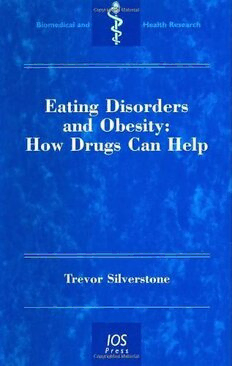
Eating Disorders and Obesity: How Drugs Can Help PDF
164 Pages·2005·0.735 MB·English
Most books are stored in the elastic cloud where traffic is expensive. For this reason, we have a limit on daily download.
Preview Eating Disorders and Obesity: How Drugs Can Help
Description:
It is customary to distinguish between 'eating disorders', and disorders of body weight, such as obesity. Eating disorders are categorized as mental illnesses, while obesity is seen primarily as a physical condition. However, such a separation is both arbitrary and unjustified. Obesity arises from behaviors which are physiologically inappropriate (such as consuming food when there is no metabolic need); conversely, eating disorders can cause profound alterations in physiology and body composition. Furthermore, many of the drugs used in the treatment of eating disorders, such as the newer 'atypical antipsychotics', frequently cause obesity, and some appetite suppressants prescribed for obesity, can cause marked changes in mood and behavior. Most patients who develop one of the eating disorders are extremely frightened of gaining weight. The disordered eating can be viewed as a pathological reaction to this fear and a distorted attempt to establish control of body! weight. This book focuses on the place of drugs in the treatment of both sets of illnesses. It is arranged in two parts: Part I addresses the science of eating behavior. It examines the physiology, psychology and pharmacology of normal eating. Part II is clinically oriented, covering each of the recognized eating disorders, and obesity. Each of its constituent chapters reviews the clinical features, the epidemiology and pathophysiology of the particular disorder being covered, before going on to discuss the available treatment options with particular reference to drugs. The last two chapters deal with disorders of eating and body weight at the two ends of the life cycle: childhood and old age.IOS Press is an international science, technical and medical publisher of high-quality books for academics, scientists, and professionals in all fields. Some of the areas we publish in: -Biomedicine -Oncology -Artificial intelligence -Databases and information systems -Maritime engineering -Nanotechnology -Geoengineering -All aspects of physics -E-governance -E-commerce -The knowledge economy -Urban studies -Arms control -Understanding and responding to terrorism -Medical informatics -Computer Sciences
See more
The list of books you might like
Most books are stored in the elastic cloud where traffic is expensive. For this reason, we have a limit on daily download.
